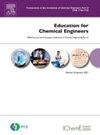One-week flipped workshop on heat integration
IF 2.3
2区 教育学
Q1 EDUCATION, SCIENTIFIC DISCIPLINES
引用次数: 0
Abstract
This paper describes the first implementation of a flipped, one-week workshop on heat integration that was taught in Spring 2024 to the 3rd Year cohort of 138 students in Chemical Engineering at Imperial College, London. The “flipped” workshop consisted of three online lessons that cover the core materials on pinch design of heat exchanger networks, which the students were required to complete ahead of each of the corresponding three face-to-face class meetings, which focused on problem-solving exercises largely carried out by the students themselves. The paper describes the teaching methodology applied, presents and analyses the results of a survey conducted to assess the students’ perceptions and degree of satisfaction with the workshop. Learning outcomes relevant to the workshop topic, that is, the ability to design and optimize heat exchanger networks in realistic plant-wide settings, are also presented and compared to those of previous years. The main conclusion is that the short workshop format can successfully achieve the learning objectives, even for relatively large class sizes. Evidently, this workshop can be taught effectively in this concentrated form provided that the workshop participants are given access to the online lessons in advance of the class exercises.
为期一周的热集成翻转工作坊
本文描述了一个为期一周的翻转热集成研讨会的首次实施,该研讨会于2024年春季向伦敦帝国理工学院化学工程专业三年级的138名学生授课。“翻转”工作坊由三节在线课程组成,涵盖了热交换器网络夹紧设计的核心材料,学生们被要求在相应的三节面对面的课堂会议之前完成这些课程,这些课程主要集中在学生自己进行的问题解决练习上。本文描述了所采用的教学方法,提出并分析了一项调查的结果,以评估学生对研讨会的看法和满意度。还介绍了与研讨会主题相关的学习成果,即在实际工厂范围内设计和优化热交换器网络的能力,并与前几年的学习成果进行了比较。主要结论是,即使对于相对较大的班级规模,短工作坊形式也可以成功地实现学习目标。显然,如果参与者在课堂练习之前可以访问在线课程,那么这种集中形式的研讨会可以有效地进行教学。
本文章由计算机程序翻译,如有差异,请以英文原文为准。
求助全文
约1分钟内获得全文
求助全文
来源期刊

Education for Chemical Engineers
Multiple-
CiteScore
8.80
自引率
17.90%
发文量
30
审稿时长
31 days
期刊介绍:
Education for Chemical Engineers was launched in 2006 with a remit to publisheducation research papers, resource reviews and teaching and learning notes. ECE is targeted at chemical engineering academics and educators, discussing the ongoingchanges and development in chemical engineering education. This international title publishes papers from around the world, creating a global network of chemical engineering academics. Papers demonstrating how educational research results can be applied to chemical engineering education are particularly welcome, as are the accounts of research work that brings new perspectives to established principles, highlighting unsolved problems or indicating direction for future research relevant to chemical engineering education. Core topic areas: -Assessment- Accreditation- Curriculum development and transformation- Design- Diversity- Distance education-- E-learning Entrepreneurship programs- Industry-academic linkages- Benchmarking- Lifelong learning- Multidisciplinary programs- Outreach from kindergarten to high school programs- Student recruitment and retention and transition programs- New technology- Problem-based learning- Social responsibility and professionalism- Teamwork- Web-based learning
 求助内容:
求助内容: 应助结果提醒方式:
应助结果提醒方式:


